Adverbs are like spices for language; they add flavor to our sentences. These special words help us describe how an action is done, when it happens, where it occurs, or to what degree. For beginners and students learning English, understanding adverbs is key to expressing yourself clearly.
Whether you’re talking about doing something ‘quickly,’ ‘yesterday,’ ‘there,’ or ‘very’ carefully, adverbs help you paint a more vivid picture with your words. They’re fun to learn and even more fun to use!
Adverbs in English Grammar
Adverbs are words that modify verbs, adjectives, other adverbs, or whole sentences, often describing how, when, where, or to what extent something is done. They are versatile, providing additional context and detail, and are essential for expressive language, enhancing meaning, and clarifying actions or qualities.
What is Adverb?
Definition:
An adverb is a part of speech that modifies verbs, adjectives, other adverbs, or whole sentences to provide more information about the manner, place, time, frequency, degree, or cause of the action or condition.
Adverbs and Its Types
Adverbs of Manner
Adverbs of manner describe how an action is performed.
- She sings beautifully.
- He quickly understood the problem.
- The baby slept soundly.
- They worked diligently on their project.
- She laughed happily at the joke.
- He drives carefully in bad weather.
- The teacher explained the concept clearly.
- She whispered softly to avoid waking the baby.
- The dog barked loudly at the stranger.
- He boldly stated his opinion.
- The children played quietly in their room.
- She gracefully danced across the stage.
- They eagerly awaited the announcement.
- He patiently taught the new skill.
- The athletes trained vigorously for the competition.
- She gently cradled the newborn.
- They merrily decorated the hall for the party.
- He firmly shook hands with his opponent.
- The comedian spoke humorously during the interview.
- She hastily packed her bags in the morning.
Adverbs of Place
Adverbs of place indicate where the action of the verb is taking place.
- She looked up.
- He searched around for his keys.
- The cat jumped down from the counter.
- They moved forward in the queue.
- The dog ran away when it saw the postman.
- She set the plates down on the table.
- He walked towards the park.
- The ball rolled underneath the couch.
- She placed the flowers outside the house.
- The kids are playing inside.
- He travels abroad every year.
- They marched through the streets.
- The bird flew overhead.
- She stepped aside to let them pass.
- He dropped his keys below the balcony.
- The hikers went upwards on the trail.
- The cat is hiding somewhere in the house.
- She looked everywhere for her lost ring.
- The storm raged outdoors.
- He leaned backward in his chair.
Must Learn About:
Nouns, Pronouns, Verbs, Adjectives, Adverbs, Interjections, Prepositions, Conjunctions
Adverbs of Time
Adverbs of time specify when an action happened, happens, or will happen.
- She will call you later.
- He immediately responded to the email.
- They have already left the building.
- I will meet you tomorrow.
- He quickly finished the task yesterday.
- She frequently visits the museum.
- They will start the work soon.
- The train arrived early.
- He has seldom seen such chaos.
- She often goes for a walk in the park.
- They rarely eat out.
- The meeting starts promptly at nine.
- He sometimes skips breakfast.
- She usually wakes up early.
- They eventually reached a consensus.
- He will soon realize his mistake.
- She recently adopted a puppy.
- They have lately been very busy.
- The concert begins tonight.
- He finally completed his novel.
Adverbs of Frequency
Adverbs of frequency describe how often an action occurs.
- She always brushes her teeth before bed.
- He never forgets his friends’ birthdays.
- They often take long walks on the beach.
- I seldom drink coffee.
- She usually arrives on time.
- He rarely complains about his job.
- They sometimes skip the gym.
- I frequently visit my grandparents.
- She occasionally treats herself to a spa day.
- He constantly checks his phone.
- They regularly attend yoga classes.
- I hardly ever watch television.
- She generally avoids eating junk food.
- He typically works late on Fridays.
- They mostly spend their holidays at home.
- I almost always read before sleeping.
- She hardly knows him.
- He nearly missed the train.
- They scarcely go to the cinema.
- I always lock the door when I leave.
Adverbs of Degree
Adverbs of degree tell us about the intensity or degree of an action, an adjective, or another adverb.
- She is extremely
- He barely passed the exam.
- They were completely surprised by the party.
- I am quite tired after the hike.
- She thoroughly enjoyed the concert.
- He just finished his assignment.
- They are highly skilled in negotiation.
- I totally agree with you.
- She was absolutely certain of her decision.
- He almost won the race.
- They were particularly interested in the lecture.
- I am very pleased with the results.
- She deeply regretted her words.
- He utterly failed at the task.
- They are somewhat responsible for the delay.
- I am incredibly grateful for your help.
- She was especially proud of her artwork.
- He is notably
- They were significantly affected by the news.
- I really don’t understand the question.
Adverbs of Probability/Modality
Adverbs of probability or modality express the likelihood or certainty of an action or event happening.
- She will probably arrive on time.
- He is certainly the best candidate for the job.
- They could possibly win the championship.
- It apparently rained last night.
- The event will presumably take place outdoors.
- She definitely knows the answer.
- He clearly misunderstood the instructions.
- I obviously can’t come to the party.
- They undoubtedly made a huge profit.
- The solution was seemingly
Interrogative Adverbs
Interrogative adverbs are used to ask questions about time, place, reason, or manner.
- Why are you late?
- When will they arrive?
- Where did you find this book?
- How did she solve the problem so quickly?
- How often do you go to the gym?
- How far is it from here to the station?
- How long will the meeting last?
- How much does this cost?
- Whereabouts is the lost and found?
- Why ever would you say that?
Relative Adverbs
Relative adverbs introduce relative clauses, providing more information about the subject.
- That is the reason why I called you.
- I remember the day when we first met.
- This is the house where I grew up.
- We need to find out the reason why they were absent.
- Do you recall the time when we saw that comet?
- The city where he was born is far away.
- The way how she handled the situation was impressive.
- I like the days when the sun sets late.
- The place where we met is now a museum.
- The reason why he’s successful is his dedication.
Conjunctive Adverbs
Conjunctive adverbs connect two independent clauses or sentences, showing sequence, contrast, cause and effect, or other relationships.
- The project was difficult; nevertheless, we completed it on time.
- He was very tired; still, he continued working.
- She studied hard for the exam; therefore, she passed with flying colors.
- I wanted to go for a walk; however, it started to rain.
- The team played well; consequently, they won the match.
- He didn’t study at all; surprisingly, he passed the test.
- It was a risky decision; nonetheless, it paid off.
- We need to hurry; otherwise, we’ll be late.
- The evidence was inconclusive; hence, the jury acquitted him.
- I was not qualified for the position; meanwhile, I applied for it anyway.
100 Examples of Adverbs in Sentences
- She quickly finished her homework.
- He spoke softly to avoid waking the baby.
- The stars shone brightly in the night sky.
- She sings beautifully in the choir.
- He arrived early for the meeting.
- She laughed heartily at the joke.
- The dog barked loudly at the stranger.
- The flowers bloomed magnificently in the spring.
- He patiently waited for his turn.
- They often go for a walk in the park.
- She rarely eats sweets.
- The sun sets slowly in the horizon.
- She cleverly solved the puzzle.
- He works diligently on his projects.
- The teacher explained the lesson clearly.
- She hugged him tightly.
- He drives carefully on the icy roads.
- The children played happily
- She whispered quietly during the movie.
- He proudly displayed his award.
- They arrived unexpectedly at the party.
- She neatly organized her desk.
- He answered correctly on the quiz.
- She danced gracefully across the stage.
- He generously donated to the charity.
- The team won convincingly against their rivals.
- She wisely invested her savings.
- The baby slept soundly through the night.
- He humbly accepted the compliment.
- They eagerly awaited the concert.
- She consistently achieves high grades.
- He meticulously cleaned the car.
- The audience applauded enthusiastically.
- She firmly stood her ground.
- He carefully folded the clothes.
- They joyfully celebrated their anniversary.
- She accidentally spilled the milk.
- He deliberately ignored the warning signs.
- The wind blew fiercely during the storm.
- She routinely jogs every morning.
- He awkwardly introduced himself.
- The cat stretched lazily in the sun.
- She curiously peeked into the box.
- He strongly disagreed with the opinion.
- The sun shone weakly through the clouds.
- She solemnly swore to tell the truth.
- He boldly went where no one had gone before.
- They efficiently completed the project.
- She sweetly sang the lullaby.
- He nervously prepared for the speech.
- The clock ticks steadily in the background.
- She angrily slammed the door.
- He successfully climbed the mountain.
- The baby cooed adorably at her mother.
- She quickly adapted to the new environment.
- He cautiously approached the wild animal.
- The team played exceptionally well last night.
- She vainly looked at her reflection.
- He flatly denied the allegations.
- They warmly welcomed the new neighbors.
- She suspiciously eyed the strange package.
- He frantically searched for his keys.
- The rain poured heavily
- She defiantly stood up for what she believed in.
- He playfully teased his sister.
- They fiercely protected their young.
- She smartly answered the tricky question.
- He absentmindedly forgot his appointment.
- The audience watched intently during the performance.
- She gently patted the dog.
- He excitedly opened the gift.
- They respectfully listened to the speaker.
- She greedily ate the last piece of cake.
- He aimlessly wandered through the streets.
- The leaves rustled softly in the breeze.
- She boldly expressed her ideas.
- He hopelessly tried to fix the engine.
- They blissfully ignored the chaos around them.
- She tactfully avoided the sensitive topic.
- He religiously follows his morning routine.
- The birds chirped melodiously at dawn.
- She desperately needed a vacation.
- He wistfully remembered his childhood.
- They confidently walked into the interview.
- She usefully contributed to the discussion.
- He miserably failed the exam.
- The stars twinkled mysteriously in the sky.
- She gratefully accepted the help offered.
- He leisurely read the newspaper on Sunday.
- They furiously argued over the issue.
- She suspiciously regarded the unfamiliar surroundings.
- He triumphantly finished the marathon.
- The children whispered secrets playfully to each other.
- She amazingly completed the task alone.
- He quietly contemplated his next move.
- They diligently worked through the night.
- She coyly avoided his gaze.
- He slyly evaded the question.
- The sunbeam peeked shyly through the curtains.
- She optimistically looked toward the future.
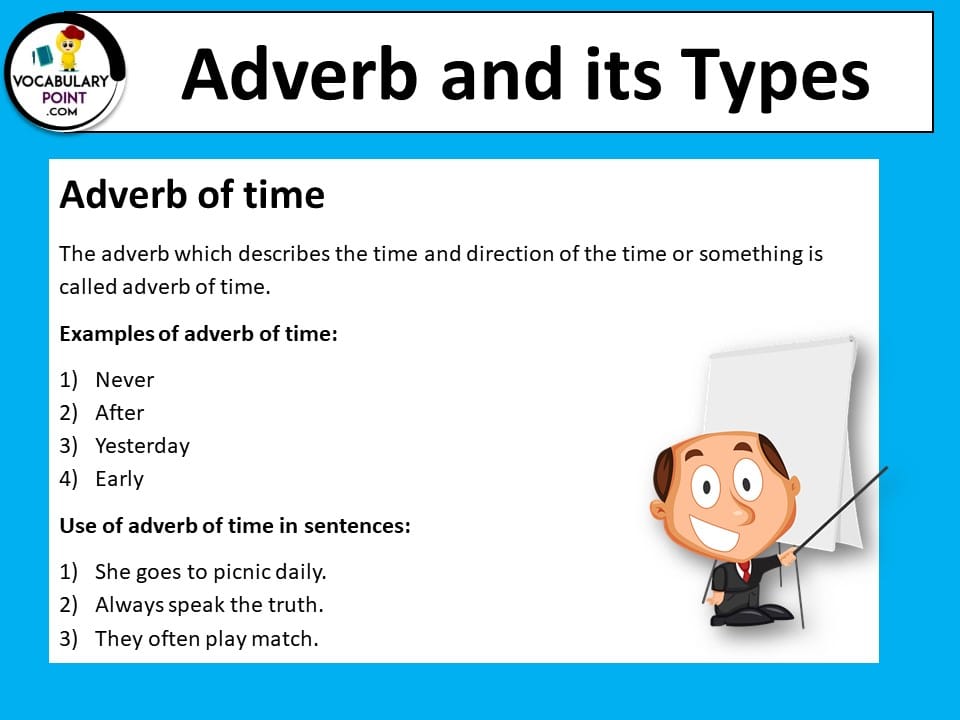
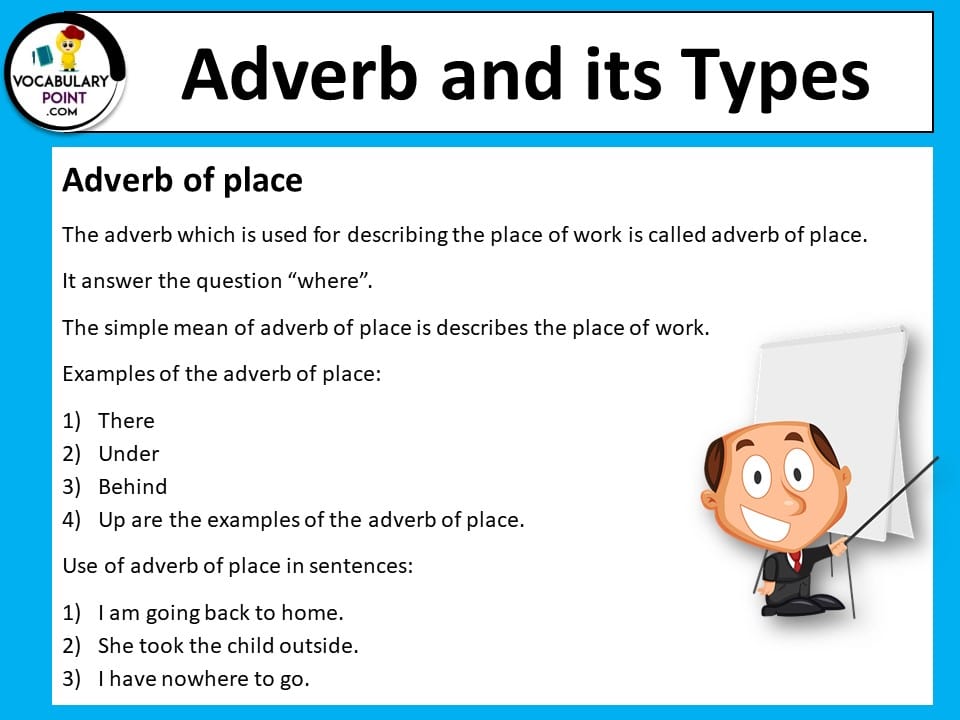
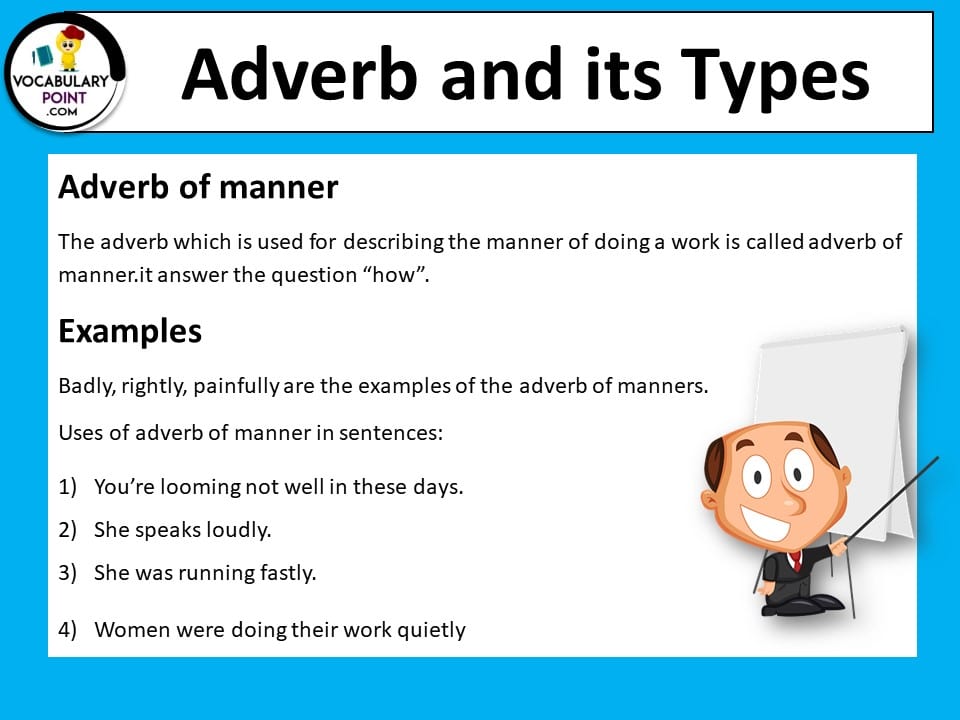
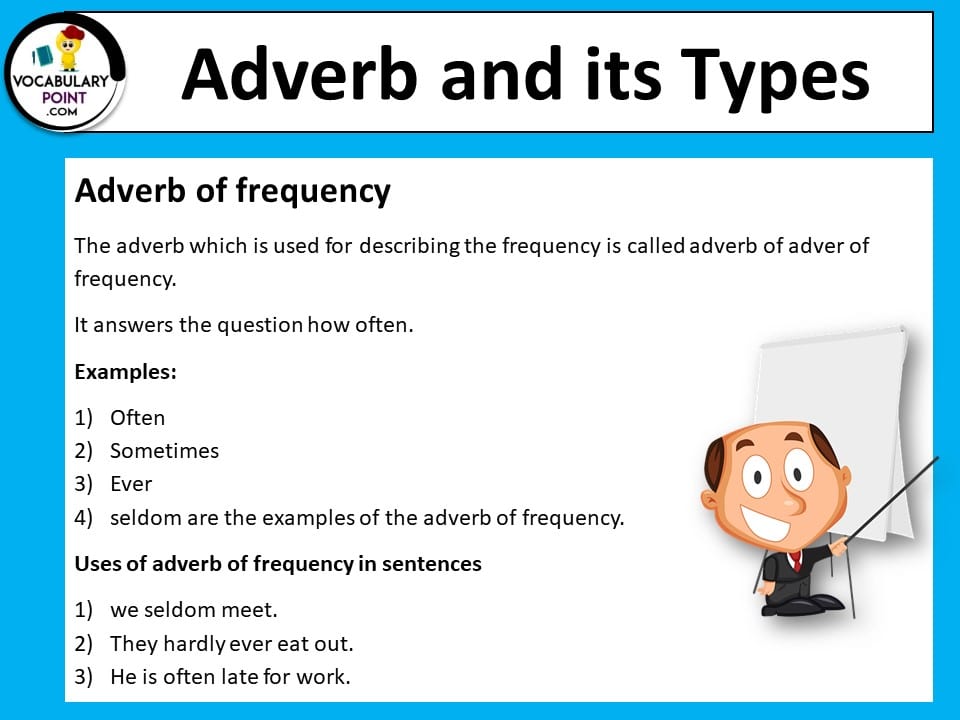
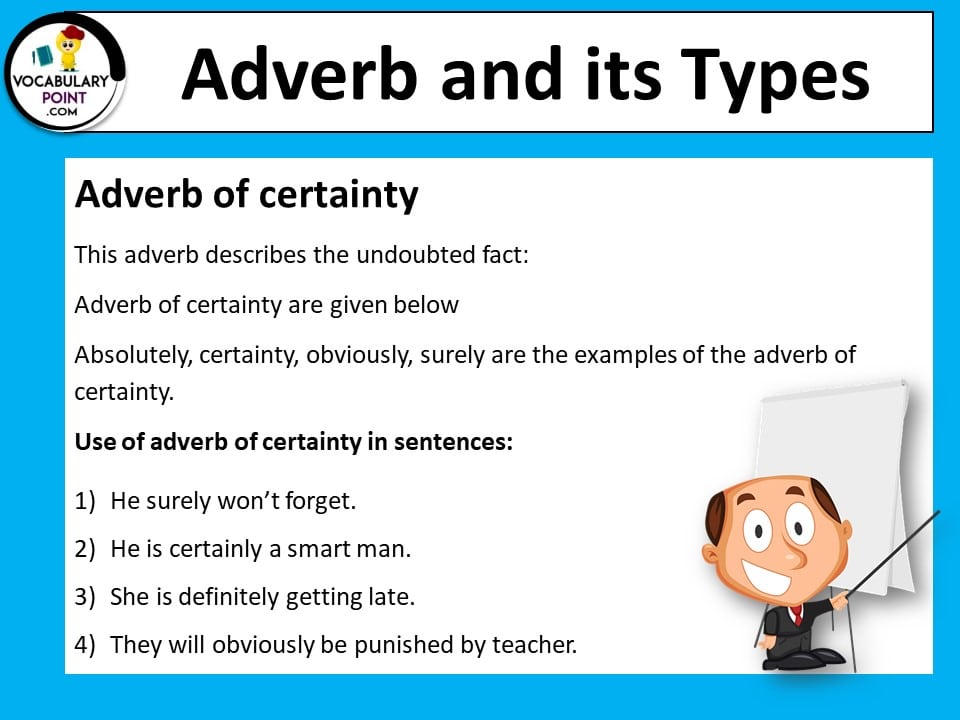
Download PDF
List of Adverbs
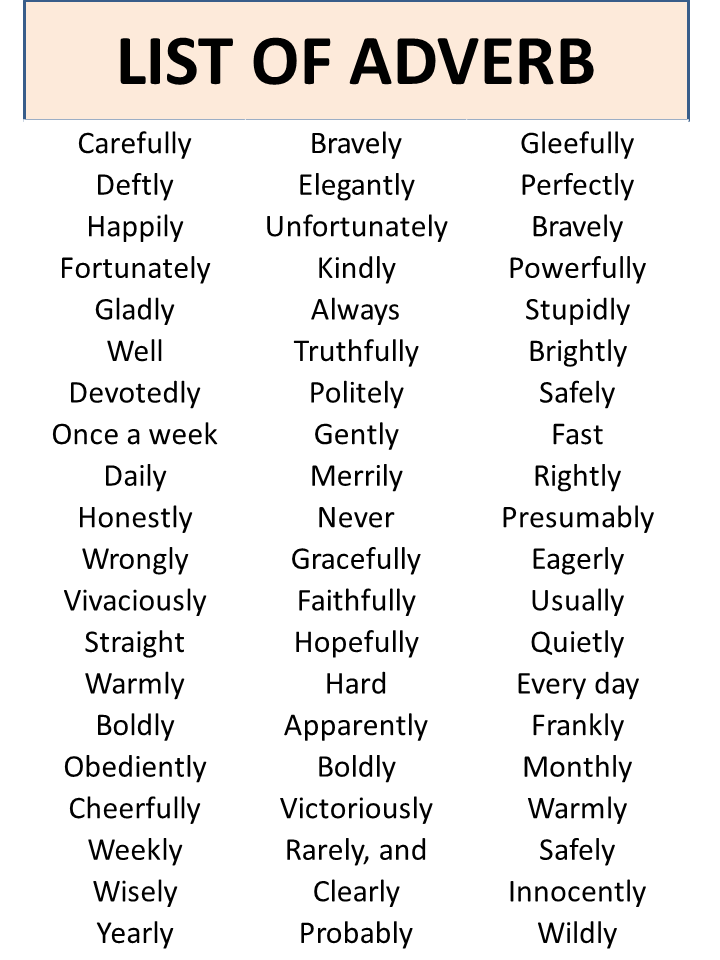
|
Leisurely |
Enormously |
Wearily |
|
Enviously |
Fast |
Haltingly |
|
Briefly |
Thunderously |
Coyly |
|
Joylessly |
Generally |
Emphatically |
|
Entirely |
Strictly |
Specifically |
|
Really |
Greedily |
Innocently |
|
Accidentally |
Patiently |
Unfortunately |
|
Knowingly |
Less |
Tonight |
|
Loyally |
Urgently |
In |
|
Briskly |
Carefully |
Still |
|
Doubtfully |
Inside |
Violently |
|
Joyfully |
Officially |
Carelessly |
|
Inaudibly |
Openly |
Far |
|
Dutifully |
Elegantly |
Noisily |
|
Irritably |
Bashfully |
Last Year |
|
Arrogantly |
Mysteriously |
Deafeningly |
|
Secretly |
Coaxingly |
Repeatedly |
|
Fairly |
Tomorrow |
Kindheartedly |
|
Enthusiastically |
Indoor |
Softly |
|
Grimly |
Elsewhere |
Casually |
|
Just |
Thankfully |
Unhappily |
|
Vivaciously |
Bravely |
Away |
|
Swiftly |
Finally |
Lovingly |
|
Eagerly |
Anywhere |
Here |
|
Today |
Fully |
Cautiously |
|
Enough |
Barely |
Expeditiously |
|
Immediately |
Wishfully |
Often |
|
Deftly |
Well |
Beautifully |
|
Blindly |
Obnoxiously |
Weakly |
|
Weekly |
Last Week |
Loosely |
|
Extremely |
Hastily |
Nervously |
|
Thoughtfully |
Powerfully |
Nightly |
|
Audibly |
Hopelessly |
Abroad |
|
Sternly |
Very |
Jealously |
|
Soundlessly |
Never |
Morosely |
|
Last Month |
Almost |
Kindly |
|
Suddenly |
More |
Ear-Splittingly |
|
Lazily |
Wisely |
Naturally |
|
Certainly |
Terribly |
Nearly |
|
Eventually |
Noiselessly |
Deeply |
|
Devotedly |
Clearly |
Silently |
|
Slowly |
Yearly |
Vociferously |
|
Easily |
There |
Sadly |
|
Colorfully |
Frequently |
Madly |
|
Rudely |
Out |
Curiously |
|
Resoundingly |
Above |
Happily |
|
Merrily |
Miserably |
Gently |
|
Boastfully |
Frankly |
Nearby |
|
Cleverly |
Rarely |
Solemnly |
|
Regularly |
Safely |
Lowly |
|
Keenly |
Defiantly |
Knavishly |
|
Anxiously |
Cheerfully |
Speedily |
|
Resonantly |
Foolishly |
Interestingly |
|
Worriedly |
Surprisingly |
Rapidly |
|
Warmly |
Soon |
Too |
|
Then |
Normally |
Angrily |
|
Unexpectedly |
Generously |
Exactly |
|
|
Mortally |
Occasionally |
|
Downstairs |
Positively |
Boldly |
|
Instantly |
Completely |
Dejectedly |
|
Crazily |
Faithfully |
Hungrily |
|
Gradually |
Already |
Painfully |
|
Towards |
Quite |
Bitterly |
|
Sweetly |
Daily |
Outside |
|
Later |
Loudly |
Fleetingly |
|
Hourly |
Seriously |
Tediously |
|
Cruelly |
Closely |
Dramatically |
|
Sometimes |
Hardly Ever |
Hurriedly |
|
Kiddingly |
Yesterday |
Restlessly |
|
Delightfully |
Uproariously |
Behind |
|
Gleefully |
Badly |
Achingly |
|
Shakily |
Excitedly |
Strongly |
|
Quickly |
Always |
Highly |
|
Kookily |
Reluctantly |
Busily |
|
Back |
Politely |
Shrilly |
|
Calmly |
Annoyingly |
Perfectly |
|
Courageously |
Selfishly |
Promptly |
|
Lively |
Seldom |
Obediently |
|
Crossly |
Faintly |
Quietly |
|
Usually |
Rather |
Gratefully |
|
Victoriously |
Correctly |
Greatly |
|
Wildly |
Gracefully |
Continually |
|
Deliberately |
Gladly |
Brightly |
|
Properly |
Fortunately |
Poorly |
|
Now |
Awkwardly |
Commonly |
|
Languidly |
Honestly |
Stupidly |
|
Truthfully |
Once a week |
Rightly |
|
Presumably |
Wrongly |
Straight |
|
Hopefully |
Hard |
Every day |
|
Apparently |
Monthly |
Rarely, and |
|
Probably |
|
|
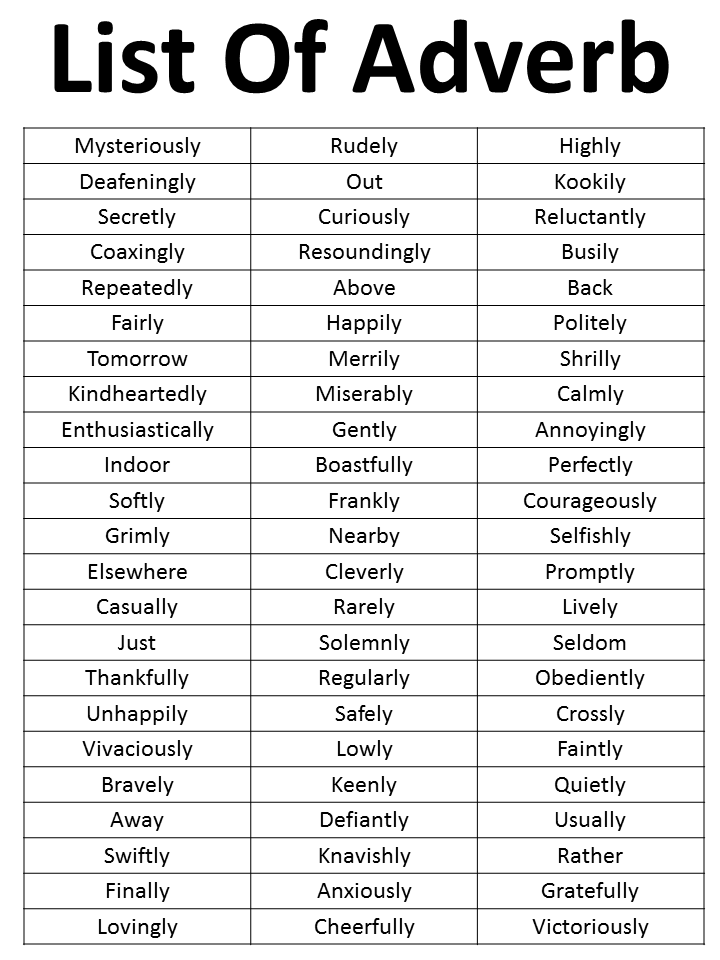
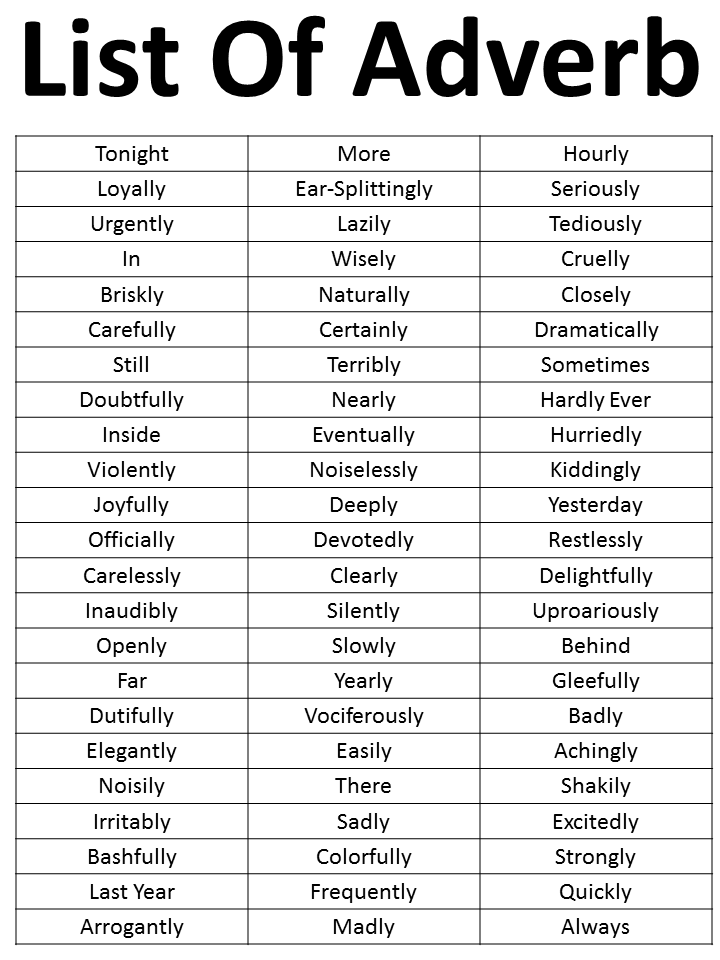
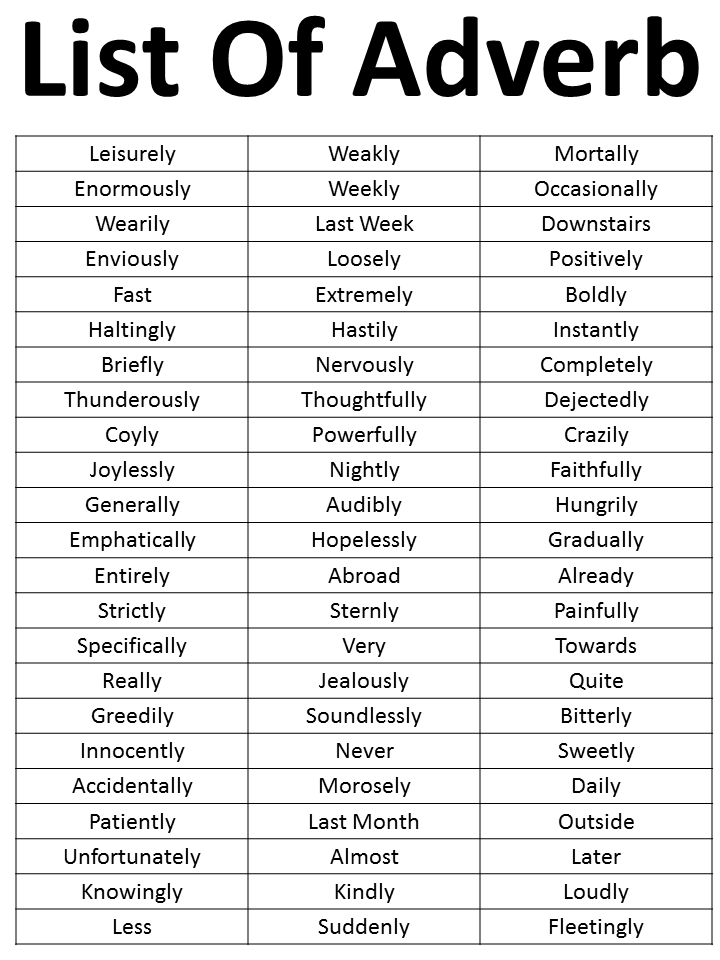
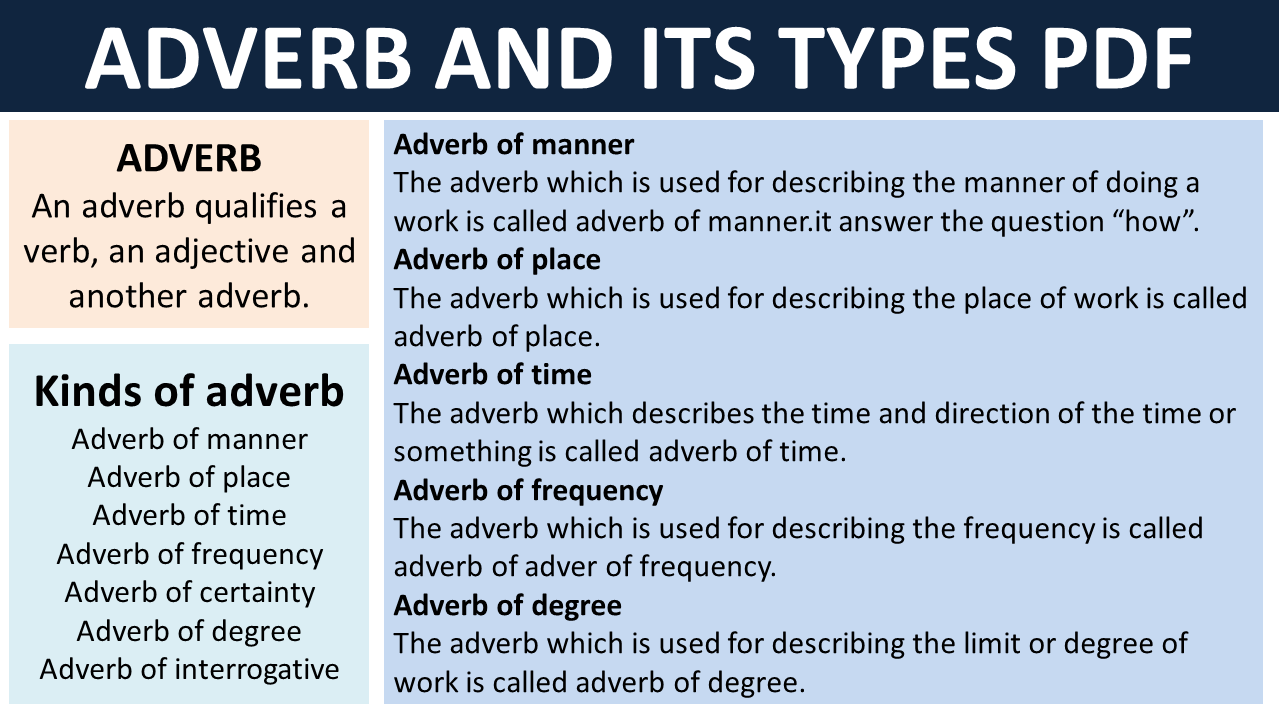
Thanks